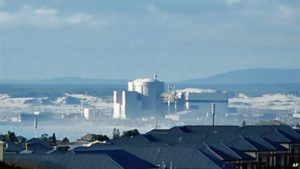
Koeberg Nuclear Power Station, about 30 kilometers north of Cape Town, is owned and operated by South Africa’s power utility Eksom
Pelindaba Nuclear Research Center, South Africa—South Africa is celebrating the 50th anniversary of its first nuclear reactor under the Atoms for Peace program.
The only country to have produced weapons-grade uranium and then voluntarily dismantle its weapons program to turn its resources toward medical research, the country abandoned its development of weapons of mass destruction in 1993.
Nuclear medicine produced at South Africa’s Pelindaba research site — generated by the SAFARI-1, water-cooled research reactor — is used in about 10 million medical procedures in more than 60 countries every year, saving millions of lives.
President Jacob Zuma addressed guests gathered to celebrate the anniversary of the SAFARI-1 project, which has produced a range of medical isotopes used for diagnosing illnesses such as cancer and heart disease.
“This child was born when there was no peace — 1965, I was doing my second year in Robben Island,” he said. “So this baby that we are celebrating was born when this country was in a very serious situation. We are celebrating today when the country is at peace with itself.”
South Africa’s apartheid government pursued a clandestine nuclear weapons program from 1974 to 1990 when the country faced violence at home, war on its borders and increasing international isolation.
It was when Pretoria abandoned its development of weapons of mass destruction in 1993 that South Africa emerged as a champion of nuclear science for peaceful means.
South Africa’s government has since pledged to build a fleet of nuclear power plants to meet a growing demand for electricity. The country is heavily dependent on coal-produced power, and the state power utility, Eskom, is in crisis due to poor maintenance and planning.
Read the full story at voanews.com


